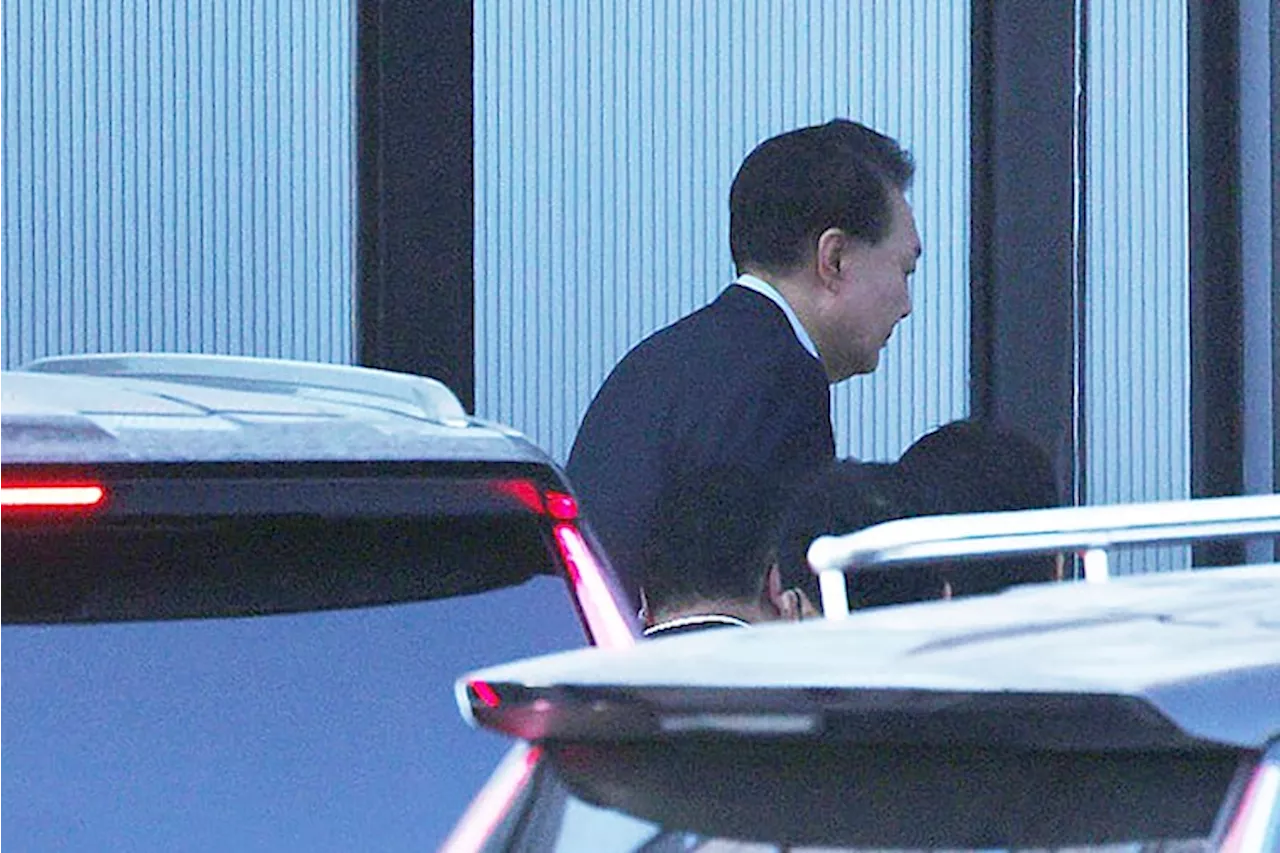South Korean President Yoon Suk Yeol has been arrested over his imposition of martial law last month. He was taken into custody by anti-corruption officials after hours of questioning at the presidential compound. Yoon, who was impeached by parliament, faces potential rebellion charges.
SEOUL, South Korea — South Korea 's impeached president, Yoon Suk Yeol, was sent to a detention center near Seoul on Wednesday night after being questioned by anti-corruption officials who took him into custody over his imposition of martial law last month. Yoon was detained in a major law enforcement operation at the presidential compound earlier in the day.
Yoon defiantly insisted that the country's anti-corruption agency, which led the raid with police, didn't have the authority to investigate his actions, but said he complied to prevent violence.Yoon, the country's first sitting president to be apprehended, now faces the prospect of a lengthy prison term over potential rebellion charges. In a video message recorded shortly before he was escorted to the headquarters of the anti-corruption agency, Yoon lamented the “rule of law has completely collapsed in this country.” Yoon had been holed up in the Hannam-dong residence in the capital, Seoul, for weeks while vowing to “fight to the end” the efforts to oust him. He has justified his declaration of martial law Dec. 3 as a legitimate act of governance against an “anti-state” opposition employing its legislative majority to thwart his agenda. The Corruption Investigation Office for High-Ranking Officials said Yoon was brought into custody about five hours after investigators arrived at the presidential compound and about three hours after they successfully entered the residence, in their second attempt. A series of black SUVs, some equipped with sirens, were seen leaving the presidential compound with police escorts. Yoon was later seen stepping out of a vehicle after arriving at the agency’s office in the nearby city of Gwacheon. Hundreds of Yoon’s conservative supporters rallied near the anti-corruption agency’s office as he underwent questioning, shouting slogans and holding signs that read: “We will fight alongside President Yoon Suk Yeol.” Also on Wednesday, an unidentified man was in life-threatening condition after an apparent self-immolation near the site, according to the Gyeonggi provincial fire department. After he was questioned for more than 10 hours, a vehicle carrying Yoon arrived at a detention center in Uiwang, near Seoul, escorted by police and presidential security vehicles. The anti-corruption agency, which is leading a joint investigation with the police and the military over whether Yoon’s actions amounted to an attempted rebellion, has 48 hours to request a court order for his formal arrest. If it fails to do so, Yoon will be released. If Yoon is formally arrested, investigators can extend his detention to 20 days before transferring the case to public prosecutors for indictment. If prosecutors indict Yoon on rebellion and abuse of power charges, which are the allegations examined by investigators, he could possibly remain under arrest until the initial court ruling, which is typically made within six months, said Park Sung-bae, an attorney specializing in criminal law. Under South Korean law, the leader of a rebellion can face the death penalty or life imprisonment, if convicted. “If the first court hands down a prison sentence, the detention simply continues,” Park said. “If they sentence him to life imprisonment, for example, he continues serving that sentence straight through.” Yoon’s defense minister, police chief and several top military commanders already had been arrested over their roles in the enforcement of martial law. The detention warrant for Yoon, issued by the Seoul Western District Court, said there were substantial reasons to suspect that he committed crimes as a “ringleader of a rebellion.” The anti-corruption agency told reporters that Yoon, during several hours of questioning through Wednesday evening, exercised his right to remain silent. Yoon’s presidential powers were suspended when parliament impeached him on Dec. 14. The impeachment case now rests with the Constitutional Court, which could formally remove Yoon from office or reject the case and reinstate him. In a separate message posted on his Facebook account after he was detained, Yoon said that “martial law is not a crime,” saying his declaration was necessary to raise awareness about an opposition that was exercising “legislative dictatorship by blocking laws and budgets” and “paralyzing” state affairs. He denied the rebellion accusations, describing his impeachment as “fraud.” As they began the detention operation in the early morning, the anti-corruption investigators and police officers engaged in an hourslong standoff at the compound’s gate with presidential security forces, but otherwise encountered no meaningful resistance. Police officers were seen using wire cutters to remove the barbed wire placed by the presidential security service on the perimeter of the compound to block their entry. Some police officers used ladders to climb over rows of buses blocking the compound’s entrance, and then the investigators began moving up the hilly compound
POLITICS SOUTH KOREA YOOON SUK YEOL IMPEACHMENT MARTIAL LAW ARREST
United States Latest News, United States Headlines
Similar News:You can also read news stories similar to this one that we have collected from other news sources.
 Supporters and opponents of impeached South Korean president hold rival protests in SeoulThousands rally in support of South Korean President Yoon Suk Yoon
Supporters and opponents of impeached South Korean president hold rival protests in SeoulThousands rally in support of South Korean President Yoon Suk Yoon
Read more »
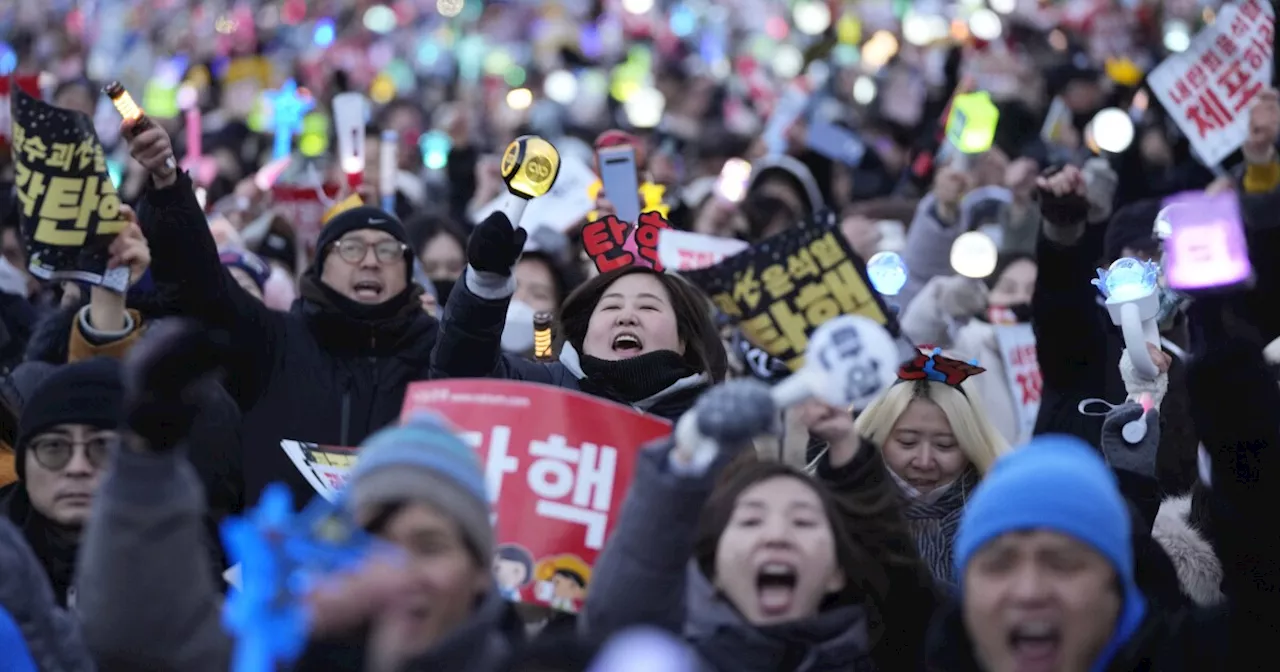 South Korea Parliament Impeaches President Yoon Suk YeolSouth Korean President Yoon Suk Yeol has been impeached by the National Assembly following a short-lived martial law decree. The Constitutional Court now has 180 days to decide whether to remove him from office.
South Korea Parliament Impeaches President Yoon Suk YeolSouth Korean President Yoon Suk Yeol has been impeached by the National Assembly following a short-lived martial law decree. The Constitutional Court now has 180 days to decide whether to remove him from office.
Read more »
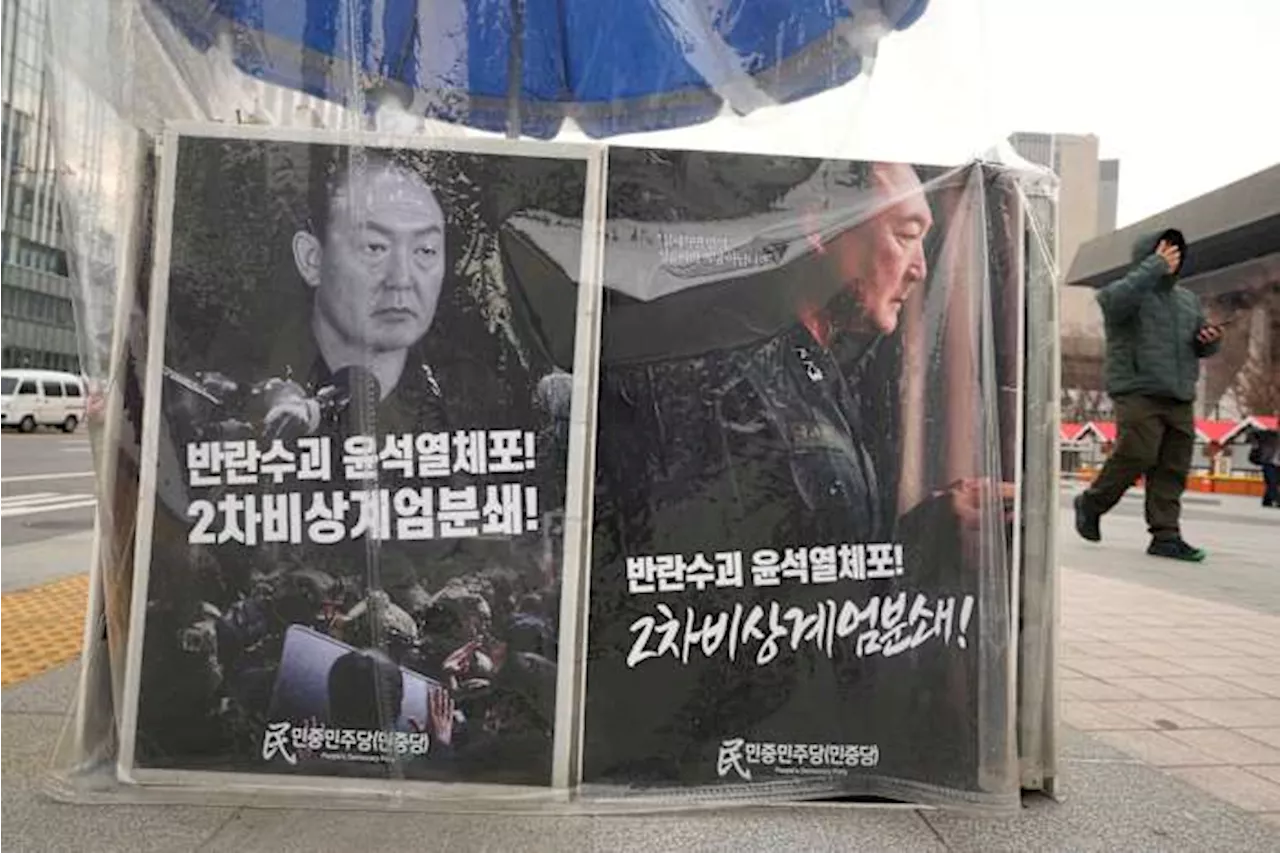 South Korean President Yoon Suk Yeol Faces Impeachment ProtestsImpeached South Korean President Yoon Suk Yeol faces widespread protests as supporters rally against his removal from office. Demonstrations demanding his arrest and opposing the impeachment take place near the Constitutional Court in Seoul.
South Korean President Yoon Suk Yeol Faces Impeachment ProtestsImpeached South Korean President Yoon Suk Yeol faces widespread protests as supporters rally against his removal from office. Demonstrations demanding his arrest and opposing the impeachment take place near the Constitutional Court in Seoul.
Read more »
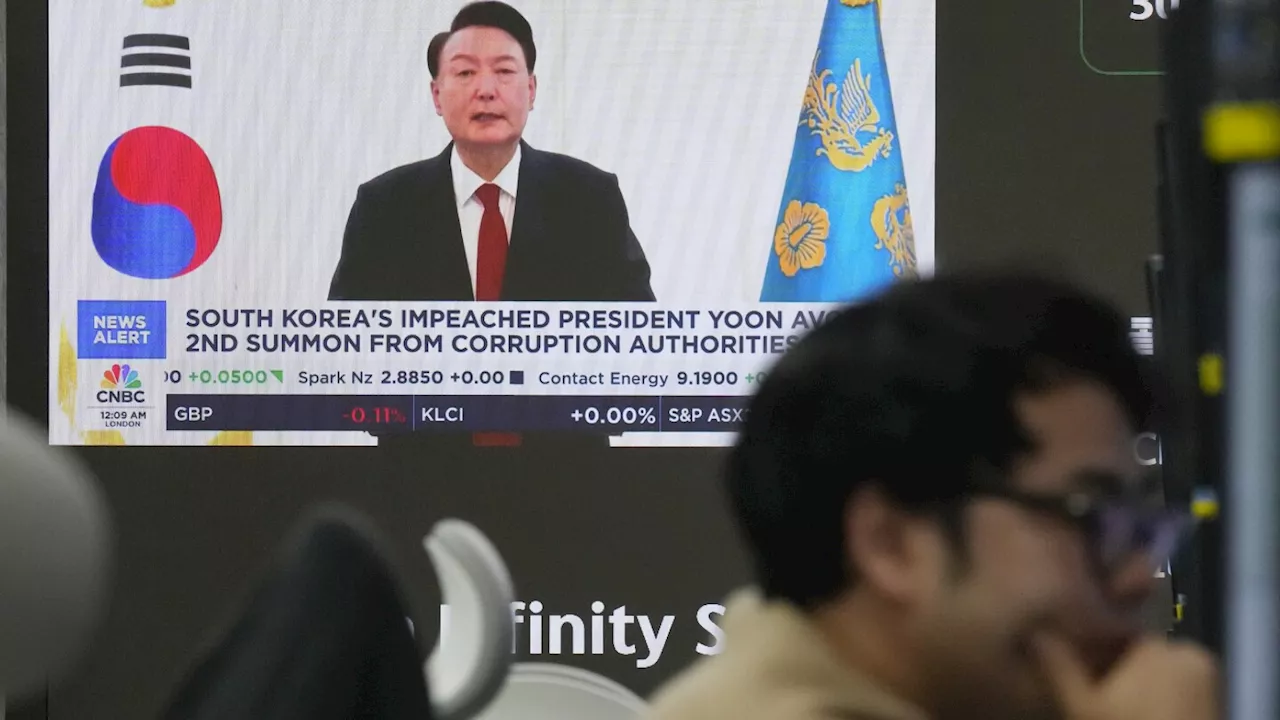 South Korea Seeks to Detain Impeached President Yoon Suk YeolSouth Korean authorities are pursuing a warrant to detain former President Yoon Suk Yeol, alleging that his declaration of martial law on December 3rd constituted treason.
South Korea Seeks to Detain Impeached President Yoon Suk YeolSouth Korean authorities are pursuing a warrant to detain former President Yoon Suk Yeol, alleging that his declaration of martial law on December 3rd constituted treason.
Read more »
 South Korea Seeks Arrest Warrant for Suspended President Yoon Suk-yeol Over Martial LawSouth Korea's joint investigation unit has requested an arrest warrant for suspended President Yoon Suk-yeol due to his brief imposition of martial law. Yoon faces charges of insurrection related to his December 3rd declaration. A Seoul court will decide on the warrant request. Yoon, suspended from presidential powers after impeachment by parliament, denies any wrongdoing.
South Korea Seeks Arrest Warrant for Suspended President Yoon Suk-yeol Over Martial LawSouth Korea's joint investigation unit has requested an arrest warrant for suspended President Yoon Suk-yeol due to his brief imposition of martial law. Yoon faces charges of insurrection related to his December 3rd declaration. A Seoul court will decide on the warrant request. Yoon, suspended from presidential powers after impeachment by parliament, denies any wrongdoing.
Read more »
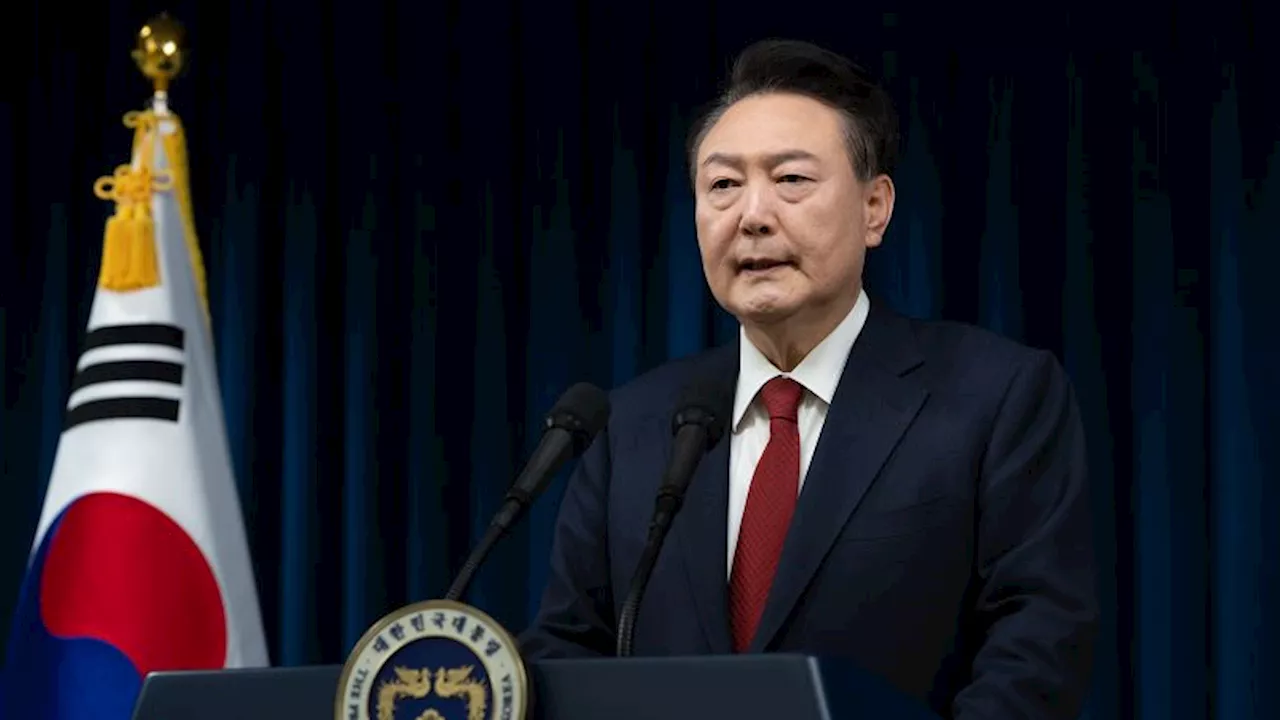 South Korean Court Approves Arrest Warrant for Former President Yoon Suk YeolA South Korean court has issued an arrest warrant for former President Yoon Suk Yeol, marking a historic moment as the first sitting South Korean president to face such action. Yoon was impeached by parliament for his controversial martial law decree.
South Korean Court Approves Arrest Warrant for Former President Yoon Suk YeolA South Korean court has issued an arrest warrant for former President Yoon Suk Yeol, marking a historic moment as the first sitting South Korean president to face such action. Yoon was impeached by parliament for his controversial martial law decree.
Read more »
